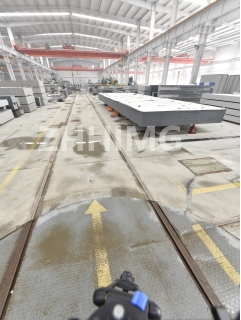Due to its durability and strength, granite is a popular choice for bases for heavy machinery and equipment. It is known for its ability to withstand heavy loads without compromising accuracy, making it an ideal material for applications requiring precision and stability.
The natural properties of granite make it an excellent choice for substrate. Its high density and low porosity make it wear-resistant, ensuring it can withstand heavy loads without compromising its structural integrity. This means that equipment and machinery mounted on granite bases maintain their accuracy and precision even under the most demanding conditions.
One of the main advantages of using granite as a substrate is its stability. The material is not only strong, but also resistant to vibrations and fluctuations, which are critical to maintaining the accuracy of precision equipment. This stability ensures that equipment remains in place and operates consistently even when subjected to heavy loads or external forces.
In addition to its strength and stability, granite is highly resistant to temperature changes and corrosion, making it suitable for a wide range of industrial and manufacturing applications. This means the base maintains its structural integrity and accuracy over time, even in harsh environments.
When considering whether a granite base can withstand heavy loads without compromising accuracy, it is important to consider the specific requirements of the application. Factors such as the weight and distribution of the load and the design and construction of the base will all play a role in determining its performance.
In summary, granite is a reliable and durable base material that can withstand heavy loads without compromising accuracy. Its natural properties make it ideal for applications requiring precision and stability, ensuring equipment and machinery operate consistently and accurately even under the most demanding conditions.
Post time: May-08-2024

